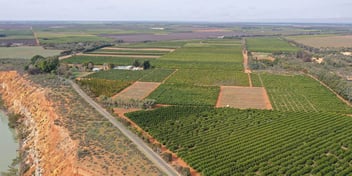Research grant to boost understanding of Murray-Darling's place in Australian life
Australian researchers are working to improve understanding of the social and cultural attitudes to water in the Murray-Darling Basin after being awarded a $280,000 Australian Research Council Special Research Initiatives grant.
The study will be a joint effort among four Australian universities, led by Griffith University’s Professor Sue Jackson, but also involving the University of Melbourne’s Professor Lesley Head, La Trobe University’s Professor Katie Holmes and Australian National University’s Professor Ruth Morgan.
The three-year project will be conducted via the Australian Rivers Institute, with Chief Investigator Professor Sue Jackson leading the study into how attitudes, values, norms and practices relating to water in the Murray-Darling Basin have evolved.
Jackson said the project aims to improve understanding of the role of the Murray Darling Basin in Australian social and cultural life.
“As the catchment for Australia’s most important river system, the basin holds a central place in Australia’s geographic imagination,” she said.
“It will investigate for the first time the ways that attitudes, norms, beliefs, and practices relating to water have developed across three regions of the basin — Mildura, the Murrumbidgee and the lower Darling — and clarify the basis of current thinking about water sharing and conflicts over water.”
Drawing on insights from environmental history and cultural geography, Jackson said the team will analyse changes in ways of understanding and relating to water, valuing its material and symbolic flows, as well as defining rights and responsibilities around water sharing.
“We will pay particular attention to the idea that environmental water is wasted and to the development of attitudes to water sharing upstream and downstream,” she said.
“The latter is particularly important to the emergence of ideas around catchment management and basin-scale water planning and allocation.
“Public reactions to environmental water can enhance or impede policy efforts to restore the Basin after decades of over-extraction, so they too are important to understand.”
This research also intends to create stronger cross-disciplinary collaborations by establishing a Water Cultures Network, and the project team will work closely with First Nations, irrigators, graziers, and water managers, including the Murray-Darling Basin Authority.
“The project aims to generate resources to enable the significant cultural change necessary to enable Murray-Darling Basin communities to address the entrenched problems of water allocation and the likelihood of a warmer and drier future,” Jackson said.


